Video Update: 11/3/2014
Just a quick video. You may notice some differences, they are seeming more active every day. ![]()
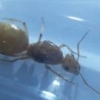
Video Update: 11/3/2014
Just a quick video. You may notice some differences, they are seeming more active every day. ![]()
That view of those ants looks amazing, their gasters are all bright and the queen is all colorful!
Do Prenolepis imparis have different color variations?
Do Prenolepis imparis have different color variations?
I think in the Northeast, they are lighter colored. The queens are at least.
Update: 10/19/2014
This colony is now up to 20 workers. ![]()
Update: 11/28/2014
Still growing as slow as ever. ![]()
Why is that? They have actually been doing pretty good.
Why is that? They have actually been doing pretty good.
Mine have showed no problems for the 4 months I have had them. ![]()
Discontinued
I found the queen dead today. ![]() Chromerust called it... This happened at the worst time possible- the colony had about 50 larvae, and a new ball of about a hundred eggs.
Chromerust called it... This happened at the worst time possible- the colony had about 50 larvae, and a new ball of about a hundred eggs. ![]() I am so sad...
I am so sad... ![]()
Edited by Gregory2455, December 8 2014 - 8:16 PM.
That really sucks. ![]()
One of my favorite colonies too. ![]()
She was the finest little ant I have seen in a long time... ![]()
I know... She stood me for half a year... I will be sure to get a lot of queens next year, and try many different setups, because I found that I really quite love this species!
Wow. I've had colonies shrink in size from thousands to a couple hundred ants and the queen not die.
This is a mystery how a queen could die from a seemingly healthy colony. Do you have any indication for what the cause may have been?
Ant Keeping →
Ant Keeping Journals →
cooIboyJ's Forelius pruinosus journalStarted by cooIboyJ , Sep 26 2025 |
|
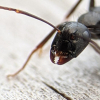
|
||
Ant Keeping →
Ant Keeping Journals →
cooIboyJ's Nylanderia vividula journalStarted by cooIboyJ , Sep 6 2025 |
|

|
||
Ant Keeping →
Ant Keeping Journals →
Ants_Dakota's Camponotus sp. JournalStarted by Ants_Dakota , Jul 13 2025 |
|
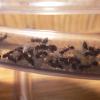
|
||
Ant Keeping →
Ant Keeping Journals →
Strickys Formica JournalStarted by stricky_ants , Jun 21 2025 |
|
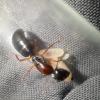
|
||
Ant Keeping →
Ant Keeping Journals →
AntTx's Camponotus sansabeanus JournalStarted by AntsTx , Jun 17 2025 |
|
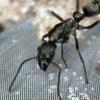
|
0 members, 0 guests, 0 anonymous users